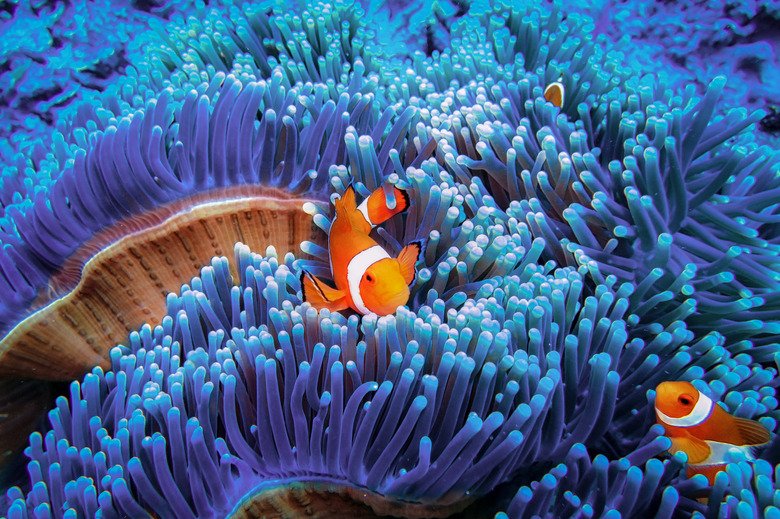How Scientists Are Using Sound To Save Dying Coral Reefs
During the last three decades, more than 25% of the coral reefs on Earth have been lost. From climate change to pollution, many factors affect the reefs and endanger them. Now, a team of scientists is testing how underwater loudspeakers can help restore dying coral reefs.
Coral Reefs Are Dying
Coral
Reefs Are Dying
According to the National Oceanic and Atmospheric Administration (NOAA), coral reefs make up about 0.2% of the oceans, but they contain 25% of all known marine species. The NOAA estimates that 500 million people around the globe depend on coral reefs because of the tourist attractions, food, coastal protection and other resources they provide.
Today, coral reefs are disappearing at a rapid rate. The NOAA explains that mass bleaching, caused by warmer ocean temperatures, has killed 29% of the Great Barrier Reef's corals and 50% of the ones in the Seychelles. Overall, 75% of the world's coral reefs have been affected by mass bleaching.
Bringing Corals Back to Life With Sound
Bringing
Corals Back to Life With Sound
A team of scientists conducted an experiment to revitalize corals in Australia's northern Great Barrier Reef. One of the problems that dead coral reefs face is that fish are less likely to visit or spend time in them. Living coral reefs are vibrant, noisy and attractive, so the team speculated that mimicking the sounds of a healthy environment might help.
Scientists used underwater loudspeakers for 40 days to attract fish to the reefs. Calling the process acoustic enrichment, the team also monitored patches without the loudspeakers and created dummy-loudspeaker reefs as controls. Their results show that "acoustic enrichment enhances fish community development" and benefits the dead coral reefs.
After 40 days, the dead reefs with loudspeakers had twice as many fish as the two types of controls. By rebuilding fish communities in the reefs, they hope that they can maintain the biodiversity of the area and provide important shelter for different marine species. Fish are a crucial part of the ecosystem, and their return could lead to other positive developments.
Better Devices to Test Coral Reefs
Better
Devices to Test Coral Reefs
Understanding how to save, restore and maintain coral reefs is a complicated process. Novel tools like underwater loudspeakers show promise, but they are not the only devices that can help corals. At the Woods Hole Oceanographic Institution (WHOI), researchers are working on a portable device called the DISCO (DIver-operated Submersible Chemiluminescent sensOr).
The DISCO is able to take water samples while completely underwater, so scientists can study coral reefs. DISCO can test for superoxide, a highly reactive compound that creates harmful "free radicals." Superoxide dissolves quickly in water, so the new device will make it easier to test for it directly on site.
Although superoxide is considered toxic, researchers think it's important for the health of coral reefs. It may play a role in the immune response, and corals may use superoxide as a defense mechanism against diseases. Considering that warmer ocean temperatures can raise the risk of certain infections in marine life, studying superoxide may reveal an important clue that benefits the survival of corals.
Not Losing Hope
Not
Losing Hope
Some believe that coral reefs are doomed and past the point of saving. However, experiments like using underwater speakers show that simple tools can bring life back to the coral reefs. The invention of new underwater devices, such as the DISCO, also reveals that science can still innovate to save life on Earth. Coral reefs are in danger, but scientists aren't going to give up on them.
Cite This Article
MLA
Bandoim, Lana. "How Scientists Are Using Sound To Save Dying Coral Reefs" sciencing.com, https://www.sciencing.com/underwater-speakers-coral-reefs-13723453/. 30 December 2019.
APA
Bandoim, Lana. (2019, December 30). How Scientists Are Using Sound To Save Dying Coral Reefs. sciencing.com. Retrieved from https://www.sciencing.com/underwater-speakers-coral-reefs-13723453/
Chicago
Bandoim, Lana. How Scientists Are Using Sound To Save Dying Coral Reefs last modified March 24, 2022. https://www.sciencing.com/underwater-speakers-coral-reefs-13723453/
